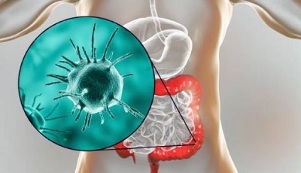
Parasitic diseases are a large group of diseases caused by worms, certain arthropods and protozoa.
Despite the achievements of modern medicine and advanced hygiene habits, according to statistics, at least 90% of people in the world face these diseases in their lifetime. You can learn from this article how to suspect a disease and which parasite tests to perform.
Types of parasites
Parasites are organisms that survive due to biological activities. They settle in the human body during the growth and reproduction of the human body, leading to the lack of trace elements, vitamins, protein and other nutrients. They can not only cause the recurrence and deterioration of chronic pathology, but also cause damage to internal organs.
The following parasites that can cause human diseases:
- Protozoa (Amba, Lambia);
- Pathogenic microorganisms (chlamydia, mycoplasma, etc. );
- Worms (round worms, pin worms, cattle and pork tape worms, etc. );
- Parasitic arthropods (mite, demodex).
The main feature of the pathology they cause is a long-term asymptomatic or low-symptomatic course. The parasites cleverly hide their existence, trying to "squeeze everything out of the host" until their reserves are exhausted and organs or tissues are severely damaged.
Symptoms of parasitic diseases
Parasitic disease most often means helminthiasis-a disease caused by the presence of worms in the body. In most cases, they are present in children, but if hygiene rules are ignored, they can develop in adults. For a long time after infection, they do not manifest in any way or are accompanied by subtle symptoms that are usually left unattended.

Every disease has certain characteristics, but there are also common symptoms:
- Headache, dizziness, weakness and fatigue. These manifestations are the result of poisoning caused by parasite waste poisoning.
- Exacerbation of bronchial asthma and allergic rhinitis, dermatitis, and urticaria. They are the result of hypersensitivity to worm cells and their excretion products.
- Digestive system rupture (abdominal pain, nausea, vomiting, heartburn, constipation and diarrhea). Worms living in the intestinal lumen can cause inflammation, and intestinal obstruction due to obstruction of the intestinal lumen.
- Anemia, vitamin deficiency, weight loss. It occurs due to the lack of protein, vitamins and minerals, and the reduction of hormone production.
- Sleep disturbance, chronic fatigue, irritability, nervousness, muscle and joint pain.
To detect most worms, a stool analysis or blood donation is required to detect the presence of specific antibodies. After admission, you can conduct research in the clinic where you live and any private laboratory. Some medical centers provide further examinations during which the presence or absence of several types of parasites in the body can be diagnosed at once.
Parasite test

If a parasitic disease is suspected, which examinations should be performed, the attending physician will make a judgment based on the chief complaint, medical history and clinical manifestations of the disease.
The diagnosis starts with a complete blood count. The most typical changes in worm disease will be:
- The level of hemoglobin decreases and the number of red blood cells decreases (caused by protein and iron deficiency).
- The number of white blood cells increases, and ESR speeds up (these are signs of inflammation of the internal organs, especially the gastrointestinal tract).
For more accurate diagnosis, fecal analysis of worm eggs and debris is used. When inspecting the stool, the pathogens of intestinal and small intestinal diseases, as intestinal diseases, hymenial diseases, and protozoan microorganisms (lamblia) can also be detected.
It is important to remember that through a study, the probability of finding worm eggs in feces is 30%. Therefore, in order to match the diagnosis result with the first negative result, the study was conducted twice, with an interval of 2-4 days.
To improve the accuracy of the study, it is important to carefully prepare stool for analysis. Only collect biological materials in special sterile containers, which can be purchased in pharmacies. A few days before the analysis, you should stop eating colored products (beets, red berries, exotic fruits, candies, and dyed beverages), and do not use laxatives and rectal suppositories.
Immunoassay
Adults and children analyzed by ELISA can detect antibodies produced by the presence of foreign bodies in the human body. For this purpose, blood is drawn from the vein, under laboratory conditions, the specificity for lamb, trichomoniasis, pork and cattle tapeworm, trichinella, Echinococcus occidentalis, Toxoplasma gondii, roundworm and pinworm can be detected in it. IgG antibodies. With the help of this research, you can detect the presence of almost all parasites in the human body.
It is not difficult to prepare for the research. After fasting for 8-10 hours, analyze on an empty stomach in the morning. On the eve of the study, it is recommended not to take antibacterial and antihistamines, nor to eat allergic foods (honey, seafood, exotic fruits and red berries, nuts). Before donating blood, experts recommend to relax in the laboratory waiting room for 10-15 minutes.
After 1-2 days, the results of the study are known. These studies can be used as the main diagnosis or as a control for ongoing treatment.
Timely detection and modern effective treatment of parasitic diseases can help avoid complications that are harmful to health.




























